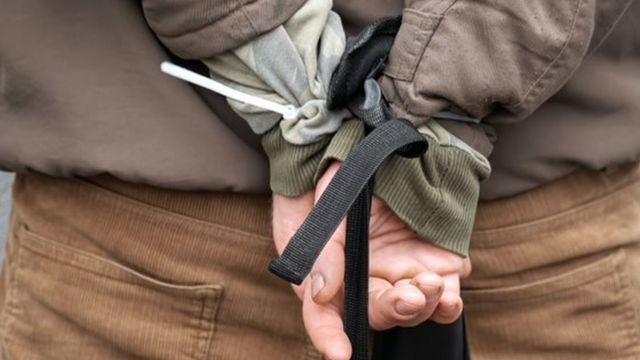
Photo by Getty Images
The plight of the fighters defending Mariupol became one of the most symbolic stories of the war in Ukraine.
According to the latest data, more than 1,000 Ukrainian servicemen trapped at the Azovstal metallurgical plant were taken to Russian-controlled settlements.
Russia’s statements that they will be treated in accordance with international norms have sharpened attention to the rules of treatment of fighters captured or surrendered during armed conflict.
Since the beginning of the invasion, both Russia and Ukraine have accused each other of ill-treatment of prisoners of war. Matilda Bogner, head of the UN human rights mission in Ukraine, recently said that there was “verified information” that both sides had committed such offenses.
Are there official rules for the treatment of prisoners of war?
So. Prisoners of war have been officially protected since 1929 by the Third Geneva Convention.
Its principles include the humane treatment, exchange of information about them and the right of officials of neutral states to visit their camps.
The convention was significantly expanded in 1949 after several World War II countries accused it of violating its rules, so the convention established, for example, the need to “protect the personal dignity” of prisoners of war.
According to the UN, the Geneva Convention has been signed by 196 countries, including Russia and Ukraine.
What protection do prisoners of war receive?
Photo by Getty Images
Russian troops demonstratively search Ukrainian fighters in Mariupol
The list of norms is long: from the right to medical care, food and housing to the prohibition of torture or exploitation of prisoners.
The agreement states that detention is not a punishment, but a tool to prevent further participation in the conflict. That is why it provides for the protection of prisoners of war from “intimidation, insult and public interest.”
And the Russian and Ukrainian authorities have been criticized for broadcasting prisoners of war, some of whom took part in press conferences.
Under the Geneva Convention, prisoners of war cannot be prosecuted simply for participating in conflicts, although the rules allow countries to prosecute them for war crimes.
The treaty also stipulates that prisoners of war must be repatriated “immediately” after the end of hostilities.
Who falls under the status of a prisoner of war?
This definition is not limited to the military. The Geneva Convention also identifies other categories of people entitled to the status of prisoners of war. These are law enforcement officers and civilians who do not take part in hostilities in the armed forces.
The exceptions are mercenaries and, in some circumstances, spies.
In the case of spies, however, the Geneva Convention states that detained spies “must be treated humanely” and cannot be deprived of the right to a fair trial.
What is the exchange of prisoners?
Photo by Getty Images
Japan’s treatment of prisoners of war during World War II resulted in thousands of deaths
The exchange of prisoners is an agreement between the parties to a conflict to exchange one group of prisoners for another.
However, such exchanges do not only take place during hostilities. During the Cold War, for example, several similar agreements were made between the United States and the Soviet Union. Exchanges also took place during the Israeli-Palestinian conflict.
The exchange is based on the Geneva Convention, but this practice has a long history. Records of such agreements date back to the XVIII century.
There have been several confirmed cases of prisoner-of-war exchanges between Moscow and Kyiv, but the Russian parliament is currently debating a law that could ban such agreements.
Do countries always follow the rules?
No, that’s why the Geneva Convention had to be expanded after a series of atrocities during World War II.
For example, Japan has shamefully exploited Allied prisoners of war – an estimated tens of thousands have died of starvation and disease.
Allegations of ill-treatment of prisoners of war during the 1991-2001 Yugoslav wars have recently become known. In 2009, a former Croat-Serb military man was sentenced to 20 years in prison for torturing and killing 200 prisoners of war.
The United States and North Vietnam have also been accused of crimes against prisoners of war in Vietnam during the 1965-75 war.
On May 17, the International Criminal Court sent a team of 42 investigators, forensic experts and support staff to Ukraine to investigate possible war crimes following the Russian invasion.
Want to get top news in Messenger? Subscribe to our Telegram or Viber !





